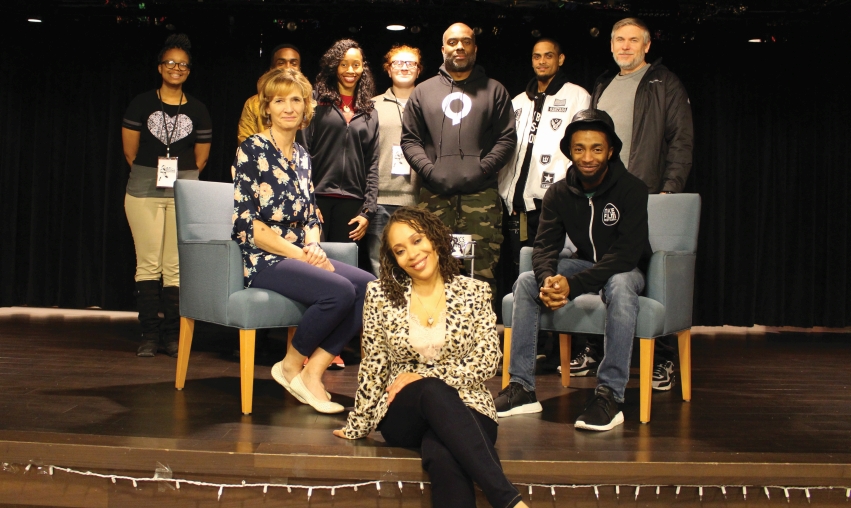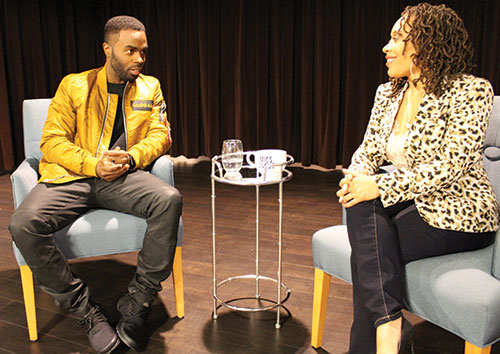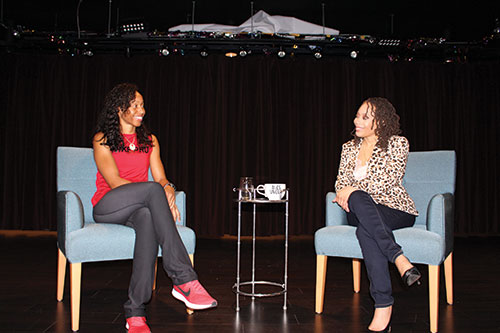
A local poet works to reveal Peoria's hidden talents... and shares inspiration in the journey.
Hosted and produced by the poet Ahavah Mauré, Mics Uncut is a Peoria original—an underground talk show spotlighting the voices of local artists, entrepreneurs and game-changers. Now in its second season, the show is both inspirational and aspirational: a platform to promote uniquely talented individuals who share just how much they’ve had to overcome or sacrifice on their life’s journey.
In its debut season, Mauré spoke with poets, musicians, authors and even a ghost hunter. The second season features another eclectic mix of guests, including an up-and-coming chef, an undefeated boxer and a rising politician. They come from diverse backgrounds and life experiences, but they are bound by a common thread: each has a powerful message to share.
Mauré conceived of the idea for her talk show just over a year ago. “There are so many people with extraordinary gifts and talents,” she explains, but their voices often go unheard. Tired of constant negativity in the mainstream media, she was tasked by her mother to “stop complaining and do something to fix it.” And with that, Mics Uncut was born.
Who is Ahave Mauré?
Ahavah Mauré is the artistic pseudonym of Mary Givens, a social worker originally from Youngstown, Ohio. Ahavah comes from the Hebrew word meaning “love,” symbolizing the kind of person she strives to be, and what she wants to reflect and embody to others. “Love,” she believes, “is a representation of God.” Mauré holds significance to her identity as an African American—“and it sounds pretty!” she adds.
 Outside of her professional career working with veterans, Mauré is a true Renaissance woman with two published books of poetryunder her belt. She also fulfilled a lifelong dream by serving in the Peace Corps in Thailand, where she procured grant funds to facilitate a youth camp on sexual and reproductive health. As the host of Mics Uncut, she approaches her guests from a place of empathy and encouragement— with a passion to go beyond the basics and delve into the intricacies of each individual's personal journey.
Outside of her professional career working with veterans, Mauré is a true Renaissance woman with two published books of poetryunder her belt. She also fulfilled a lifelong dream by serving in the Peace Corps in Thailand, where she procured grant funds to facilitate a youth camp on sexual and reproductive health. As the host of Mics Uncut, she approaches her guests from a place of empathy and encouragement— with a passion to go beyond the basics and delve into the intricacies of each individual's personal journey.
While her love for writing and poetry dates back to childhood, Mauré didn’t begin taking herself seriously as a writer until college. Like most poets, her voice has developed over time, exploring the complexities of love, hate, religion and relationships. Her poems are often cryptic, she says, employing abstract language that leave them open to many layers of interpretation.
For Mauré, the writing process is cathartic, a way to access beauty and inspiration through pain and struggle. She’s had her fair share of challenges along the way: overcoming illness and domestic violence, as well as the unexpected passing of her father. In writing, the tragedy and trauma she has experienced are translated into art. Though Mauré occasionally performs her poetry, she generally labels herself a poet/writer as opposed to a spoken-word artist. Each are deserving of respect, she explains, but there is a distinction between the two. Spoken word is written for the stage, while her poetry is intended to be read on the page.
Her first book, Journeys of the Blind of Heart, illustrates the earliest stages of Mauré’s own poetic journey. Her most recent work, Shelter at the Lighthouse, showcases the evolution in her style and strengths as a poet, painting in words the duality of love— “where sensation and impulse uncontrollablythrash against inhibition.” Like the collection it was inspired by, the great Chilean poet Pablo Neruda’s Twenty Love Poems and a Song of Despair, each poem is displayed in English alongside the Spanish translation.
Mauré describes her work as “a representation of my spirit”; she writes in order to respect the gift she believes is God-given. Writing is “that thing that makes me me,” she declares. The creative process brings her more in tune with herself, she adds, and she takes the development of her craft seriously. That means waking up in the middle of the night to jot down ideas that come to her, which would otherwise be long gone by morning—or even selling her car on Craigslist in order to publish her second book. The difference between success and failure, Mauré believes, often comes down to how much you believe in yourself and the level of support around you. Mics Uncut is her way to pay that support forward: to help others who show the same drive and commitment, who are working hard and making sacrifices to pursue their dreams.
A Production of Meaning
When Mauré started Mics Uncut, a revolving door of people helped her execute the show, which she describes as a huge learning experience. “I went from being a poet/artist to a businesswoman overnight,” she says, which required a lot of “learning as I go along.” In the second season, she made it a priority to find collaborators who share her vision, and now has a dedicated and talented team helping her put the show together, including videographer/editor Jean Quest, executive assistant Breazae Williams and stage manager Noah Hardin.
Mauré selects her guests carefully—they must meet her criteria of presenting a positive message and fitting in some way under the label of “artist, entrepreneur or game-changer.” The process begins with a search for art, music or products that appeal to her personally, or for which she has appreciation or respect. She also relies on her network of friends and supporters to identify potential guests. (Interested parties are encouraged to submit an application on her website or tag @micsuncut on Instagram.) From there, she sends a formal invitation to appear on the show and requests a detailed biography, which is crucial to producing a high-quality interview.
In conducting her interviews, Mauré always strives to go beyond the superficial. It’s clear that she’s done meticulous research and immersed herself in learning about her guests and their craft. The show's pilot episode featured St. Louis native Louis Conphliction, an award-winning slam poet who discussed the challenges he faces as an artist. Mauré has also hosted a number of musicians, including Rich P Evolon, a Peoria native who used hip hop to secure better opportunities and escape criminality, and Black Efron, a local singer and rapper who prides himself on his versatility and originality.
Many of her guests use their art as a therapeutic means to address traumas they’ve experienced. Megan Riley, for example, is a writer and rape survivor who uses poetry to channel her struggles in reclaiming her life and sexuality; Anne Peterson is a prolific author who has published poetry, devotions, a children's book and a memoir about surviving domestic abuse. Another recent guest, Alden Braddock, is a mental health practitioner and poet who shares how his art helped him recover from drug addiction.
 While still unveiling episodes from the first season of Mics Uncut, Mauré and her crew recently wrapped up filming on the second season at the George Washington Carver Community Center—and they are already gearing up for season three. Mauré is excited about the forthcoming season, and her dreams for the show’s future include syndication and a live audience. Right now though, she is focused on proving herself and putting out the quality product she believes her guests deserve.
While still unveiling episodes from the first season of Mics Uncut, Mauré and her crew recently wrapped up filming on the second season at the George Washington Carver Community Center—and they are already gearing up for season three. Mauré is excited about the forthcoming season, and her dreams for the show’s future include syndication and a live audience. Right now though, she is focused on proving herself and putting out the quality product she believes her guests deserve.
Mauré’s desire to “tell their story in a respectful way and produce a show that they’re proud to be a part of” is what ultimately drives her. With many more episodes to come, Mics Uncut has already proven to be an exciting addition to Peoria’s arts and culture scene. a&s
To watch episodes of Mics Uncut, visit ahavahnow.com or check out Mauré’s YouTube page at youtube.com/user/Ahavah3. The show can also be found on Facebook and Instagram (@micsuncut, @ahavahmaure), where Mauré posts behind-the-scenes photos and clips.
- Log in to post comments

